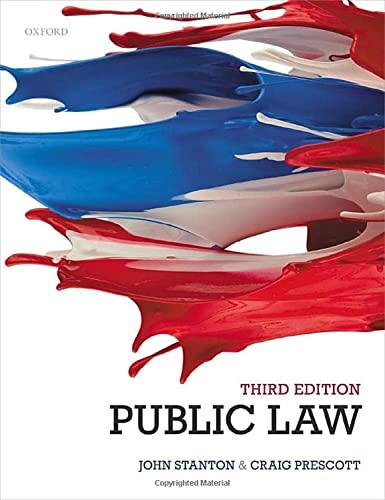Question
I need a SUMMARY of this information: A utilitarian [believes] that the principle of utility obligates persons to act in certain ways with respect to
I need a SUMMARY of this information:
A utilitarian [believes] that the principle of utility obligates persons to act in certain ways with respect to others and in certain ways with respect to themselves, both in pursuit of the greatest happiness for the greatest number. ...Mill argues that the individual is usually the ideal [decider] of his own good because he is generally in the best position to ascertain what will further his own good. ...A person could [have] a duty to protect information about herself from disclosure for the sake of her own happiness, because her own happiness is part of the utilitarian calculus, too....
[As a utilitarian, t]he moral case I would ultimately make for protecting my own privacy is not just about what I may owe myself, it is also about how my choices may harm others.... I may have an obligation to safeguard my own privacy because, if I don't, I contribute to methods of business (e.g., persistently weak privacy policies) and lines of business (e.g., data mining) that seriously harm the interests of others. ...
A [virtue ethics]...morality might treat a degree of modesty and reserve as favorable character traits conducive to the best life. Imagine a man with colon cancer who tells his coworkers in a limited-distribution e-mail that he has colon cancer and is about to take some time off from work to begin treatment. Such a sensitive disclosure is not one that I would characterize as unethical. But now imagine that this same man e-mails, unsolicited, to his same coworkers a detailed electronic diary about his cancer that includes photographs of his surgical wounds, MRIs, and X rays, along with emotional accounts of his feeling before, during, and after months of chemotherapy, radiation, and recovery. Now we have "oversharing" that raises ethical concerns. Why? Because of the discomfort he causes others, but also, critically, for the damage to his own reputation, his loss of dignity, and his departure from good judgment and temperate character.
[A]nother example of virtue-ethics grounds for keeping information about oneself private...[comes from] a well-known passage from the book ofMatthewin the Christian Bible commending secrecy concerning our acts of charity, prayers, and piety. What would otherwise be pious virtue devolves into approval-seeking performance when flamboyantly disclosed to others. It seems to take something away from the good of what we do if we do it primarily in public spaces to score points with others. The culture of disclosure and self-disclosure that recognizes no meaningful limit to showing off and exhibitionism is ethically flawed, whatever its practical rewards. ...
Privacy is a requirement of our freedom, our dignity, and our good character. It is a foundational good, suitable for enshrining as a fundamental human right. In my view, people do indeed have a moral or ethical obligation to protect their own privacy (the same way they have a moral or ethical obligation not to lie, cheat, or steal).... Favoring privacy over publicity is not a matter of taste alone, like the choice between a white or blue breath mint. On the contrary, there will be situations in which it can be morally imperative to choose privacy...
I am suggesting a new, richer way to think about the moral relationship of consumers to business and governmentas partnerships in ethical goodness.
Step by Step Solution
There are 3 Steps involved in it
Step: 1

Get Instant Access to Expert-Tailored Solutions
See step-by-step solutions with expert insights and AI powered tools for academic success
Step: 2

Step: 3

Ace Your Homework with AI
Get the answers you need in no time with our AI-driven, step-by-step assistance
Get Started


